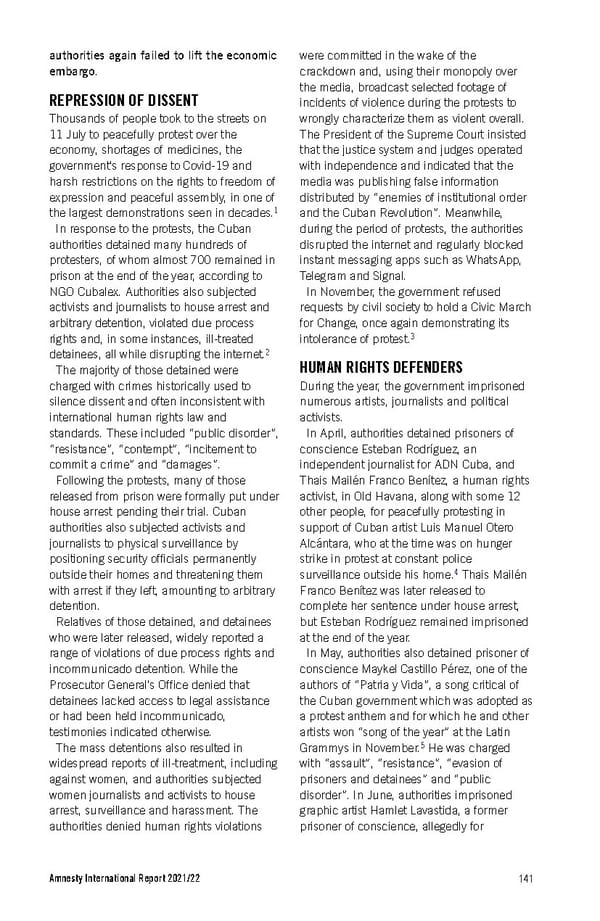authorities again failed to lift the economic were committed in the wake of the embargo. crackdown and, using their monopoly over REPRESSION OF DISSENT the media, broadcast selected footage of incidents of violence during the protests to Thousands of people took to the streets on wrongly characterize them as violent overall. 11 July to peacefully protest over the The President of the Supreme Court insisted economy, shortages of medicines, the that the justice system and judges operated government’s response to Covid-19 and with independence and indicated that the harsh restrictions on the rights to freedom of media was publishing false information expression and peaceful assembly, in one of distributed by “enemies of institutional order 1 the largest demonstrations seen in decades. and the Cuban Revolution”. Meanwhile, In response to the protests, the Cuban during the period of protests, the authorities authorities detained many hundreds of disrupted the internet and regularly blocked protesters, of whom almost 700 remained in instant messaging apps such as WhatsApp, prison at the end of the year, according to Telegram and Signal. NGO Cubalex. Authorities also subjected In November, the government refused activists and journalists to house arrest and requests by civil society to hold a Civic March arbitrary detention, violated due process for Change, once again demonstrating its rights and, in some instances, ill-treated intolerance of protest.3 2 detainees, all while disrupting the internet. HUMAN RIGHTS DEFENDERS The majority of those detained were charged with crimes historically used to During the year, the government imprisoned silence dissent and often inconsistent with numerous artists, journalists and political international human rights law and activists. standards. These included “public disorder”, In April, authorities detained prisoners of “resistance”, “contempt”, “incitement to conscience Esteban Rodríguez, an commit a crime” and “damages”. independent journalist for ADN Cuba, and Following the protests, many of those Thais Mailén Franco Benítez, a human rights released from prison were formally put under activist, in Old Havana, along with some 12 house arrest pending their trial. Cuban other people, for peacefully protesting in authorities also subjected activists and support of Cuban artist Luis Manuel Otero journalists to physical surveillance by Alcántara, who at the time was on hunger positioning security officials permanently strike in protest at constant police 4 outside their homes and threatening them surveillance outside his home. Thais Mailén with arrest if they left, amounting to arbitrary Franco Benítez was later released to detention. complete her sentence under house arrest, Relatives of those detained, and detainees but Esteban Rodríguez remained imprisoned who were later released, widely reported a at the end of the year. range of violations of due process rights and In May, authorities also detained prisoner of incommunicado detention. While the conscience Maykel Castillo Pérez, one of the Prosecutor General’s Office denied that authors of “Patria y Vida”, a song critical of detainees lacked access to legal assistance the Cuban government which was adopted as or had been held incommunicado, a protest anthem and for which he and other testimonies indicated otherwise. artists won “song of the year” at the Latin 5 The mass detentions also resulted in Grammys in November. He was charged widespread reports of ill-treatment, including with “assault”, “resistance”, “evasion of against women, and authorities subjected prisoners and detainees” and “public women journalists and activists to house disorder”. In June, authorities imprisoned arrest, surveillance and harassment. The graphic artist Hamlet Lavastida, a former authorities denied human rights violations prisoner of conscience, allegedly for Amnesty International Report 2021/22 141
 Amnesty International Report 2021/22 Page 140 Page 142
Amnesty International Report 2021/22 Page 140 Page 142